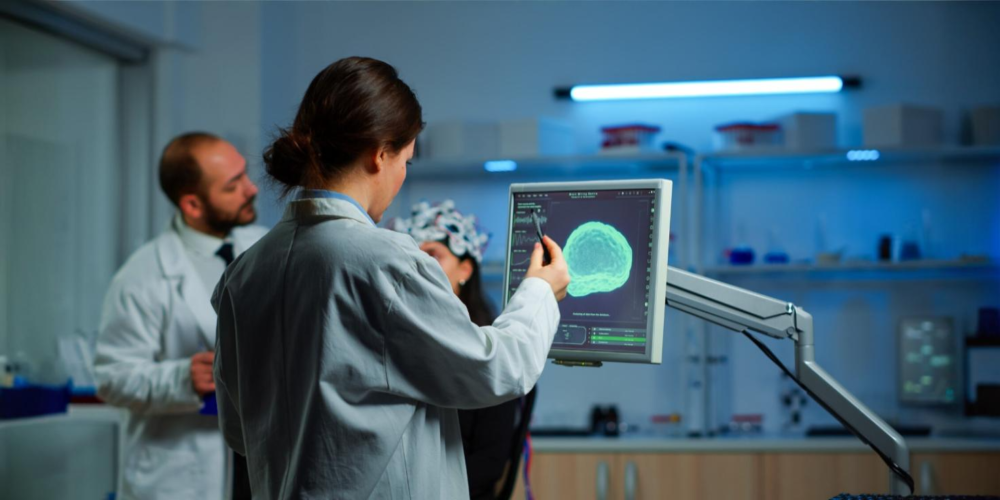Latest
How AI tool “DeepMerkel” is improving treatment predictions for aggressive skin cancers
While AI has made significant strides in cancer detection globally, its role in India is still evolving
Author
Author
- admin / 10 months

- 0
- 4 min read

Author
In what is being called a major leap forward for cancer care, researchers have developed an artificial intelligence (AI) system capable of predicting the course and severity of aggressive skin cancers like Merkel cell carcinoma (MCC). Named “DeepMerkel”, this AI tool can help doctors tailor treatments to individual patients, ensuring they receive the most effective care possible.
The team behind the innovation, led by researchers at Newcastle University, combined cutting-edge machine learning with clinical expertise to create a web-based system. By analysing personal and tumor-specific features, DeepMerkel generates personalised predictions about treatment outcomes, empowering doctors and patients to make informed decisions.
Tackling a rare but deadly cancer
Merkel cell carcinoma is a rare and highly aggressive form of skin cancer that primarily affects older adults, particularly those with weakened immune systems. Often diagnosed at an advanced stage, Merkel cell carcinoma is notoriously difficult to treat and is associated with poor survival rates.
“In recent years, there have been major advancements in our understanding of MCC biology; however, survival rates remain low (5-year overall survival [OS] 0–18%) for advanced-stage MCC. There are currently no approved therapies for advanced-stage MCC,” a study published in the European Journal of Cancer says.

Over the past two decades, the number of cases has increased worldwide, making this breakthrough all the more critical.
Dr Tom Andrew, a plastic surgeon and cancer research UK-funded PhD student at Newcastle University, is the lead author of the research. The research quotes him saying, “This system allows us to predict the course and severity of Merkel cell carcinoma, enabling us to personalise treatment so that patients receive the best possible care. By using AI, we’ve uncovered subtle patterns in the data that allow us to provide more accurate predictions for each patient.”
How ‘DeepMerkel’ works
The team used advanced statistical and machine learning methods to develop DeepMerkel. By analysing data from nearly 11,000 patients across two countries, the AI system can identify high-risk patients at earlier stages of the disease. This allows clinicians to make more informed decisions about when to use aggressive treatments or intensive monitoring.
In a study published in Nature Digital Medicine, the researchers detail how they utilised advanced statistical and machine learning techniques to develop DeepMerkel.
Dr Aidan Rose, Senior Clinical Lecturer at Newcastle University and Consultant Plastic Surgeon at Newcastle Hospitals NHS Foundation Trust, emphasised the importance of the tool: “Being able to predict patient outcomes is critical for guiding clinical decisions, especially for aggressive cancers like MCC. This AI-driven tool provides personalised survival predictions and helps medical teams determine the best treatment options for each patient.”
AI and early cancer detection in India
First Check spoke to Dr Uma Satya Ranjan, Professor at Sri Ramachandra Faculty of Engineering and Technology, Tamil Nadu, specialising in Mathematical Modelling, Optimisation, Machine Learning, and Deep Learning, to understand how AI is transforming cancer detection in India.
According to Dr Ranjan, while AI has made significant strides in cancer detection globally, its role in India is still evolving. “There are AI tools available for cancer detection, but we need to distinguish between research advancements and real-world implementation,” she said.
Explaining the detection process, she noted that AI-based models can analyse skin lesions and distinguish between benign and malignant growths, aiding in early diagnosis.
However, she stressed that a definitive cancer diagnosis still requires a biopsy. “AI can assist in early-stage detection, but confirmation requires clinical validation,” she said.
Also read: World Cancer Day: Viral Cancer Misinformation Trends










